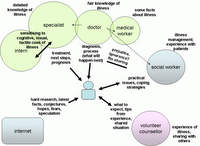A collection of charred scraps kept in a Greek museum's storerooms are all that remains of what archaeologists say is Europe's oldest surviving book which may hold a key to understanding early monotheistic beliefs. More than four decades after the Derveni papyrus was found in a 2,400-year-old nobleman's grave in northern Greece, researchers said Thursday they are close to uncovering new text through high-tech digital analysis from the blackened fragments left after the manuscript was burnt on its owner's funeral pyre...
Now, archaeologist Polyxeni Veleni believes U.S. imaging and scanning techniques used to decipher the Judas Gospel which portrays Judas not as a sinister betrayer but as Jesus' confidant will considerably expand and clarify that text. [ Continue reading] See Google News and other Blogs on this news story
Faithwise Related Stories:
Related Resources:

The above diagram offers interesting visualization for sharing knowledge, and is worth being considered for adapting in the Multifaith & Multicultural environments.
Community Wise Resources:
What exactly is knowledge-based community development? ... Should you be thinking about going the way of knowledge-based community development? ...
Local Content: Internal Information and Knowledge Sources . . . . . .
Indigenous Knowledge . . . . . . . . . . . . . . . . . . . . . . . .
Traditional Objects and Items like Photos . . . . . . . . . . . . . . .
Other Locally Created Information . . . . . . . . . . . . . . . . . .
External Information and Knowledge Content
See: previous item in this blog:
Knowledge Management Applications in Multifaith & / or Multicultural Transactions


 The Blog Content Map is helpful organizing diverse material/content.
The Blog Content Map is helpful organizing diverse material/content. 
 You are here
You are here 




9 comments:
Interesting visualisation of KM in a medical context. Could be a template for any other item of folk knowledge. Incidentally, you may want to pull into the diagram some elements of J. Surowiecki's "Wisdom of Crowds", e.g.
What makes crowds smart:
* Diversity of opinion: Each person should have private information even if it's just an eccentric interpretation of the known facts.
* Independence: People's opinions aren't determined by the opinions of those around them.
* Decentralization: People are able to specialize and draw on local knowledge.
* Aggregation: Some mechanism exists for turning private judgments into a collective decision.
Just a humble opinion.
I'm glad you liked this visualisation Mohamed, Joe... I like the wisdom of crowds idea, will think about it further!
Patrick
JC
Thanks for the visual stop.
And you are right. It is a template for any one to adapt in KM.
By the way, your comment is humble, but really inspiring.
Best, Mohamed
Patrick:
In case you are thinking further, I wish you consider in both directions, viz., horizontal and vertical.
Netizens think of horizontal as the surface, or more probably do flat thinking. Vertical, in this context, is going in the deep Web, i.e., going vertically by industry or subject categories.
However, here, I wish to use a religious analogy. Most religions have this pattern. And, let me clarify:
Horizontal refers in this sense to the communitas, or the network of communities -- sharing works, words, etc. In this context, you are talking with people and gathering the tangible, by and large.
And vertical refers to the top to down (coming from the divine) or vice-versa. In this context, you may find the tacit, as a dominating source.
And both these streams, herein, are in interactive and dynamic modes.
I have some scholarly citations on the above classification, what I call as knowledge transaction patterns in religious domain, and will be happy to share.
By the way, thanks for your continued interest in knowledge sharing, and facilitating this sharing spree to go at, no less than, godspeed.
Mohamed, this is very insightful... it ties in very strongly with Hal Richman's comment, which suggests that many knowledge sharing events are designed to be "vertical" even though they probably would be better off as "horizontal".
Patrick
Dear Dr. Taher:
A paper in the current issue of the e-journal Knowgenesis: International Journal of Technical Commniction breifly deals with knowledge management vis a vis community knowledge.
I read in your blog a piece about KM applied outside the corporate environment.
Best wishes
A. Neelameghan
Dear Prof. Neelameghan
Thanks for this info.
KnowGenesis International Journal for Technical Communication (IJTC) is really a worthy source. By the way, it is free fulltext.
Incidentally, its name relates to Genesis in Biblical sense, showing a connection to tacit knowledge as understood by the religious and spiritual groups in the world.
Such a KM connection to non-business domain is not comming from my mindmap. A comment in the first issue by Prashanth Menon (2006-03-27) reads as follows:
"Thanks for a very valuable article on the genesis and journey of writing and language from our early scriptures and scientific works. I could not have asked for a better editorial!"
I simply congratulate the publishers and the editor for such a spirited content, context and communication channel.
Best, Mohamed
Dear Dr. Taher,
Thank you very much for your kind words. It really lifted our spirit. People like you are the main driving factor of the KnowGenesis success.
If you are interested in contributing your work to
KnowGenesis, please let me know.
Best Wishes,
Saurabh Kudesia
Co-founder, Editor-in-chief
KnowGenesis International Journal for Technical
Communication (IJTC)
www.knowgenesis.net/journal
Thanks Saurabh for your good words.
I have just finished my review of the e-Journal, KnowGenesis.
This is posted at my other blog: Reviews and Reviewers.
Post a Comment